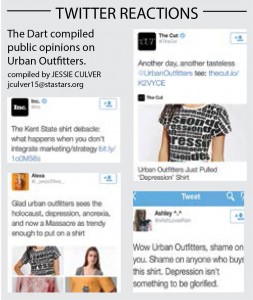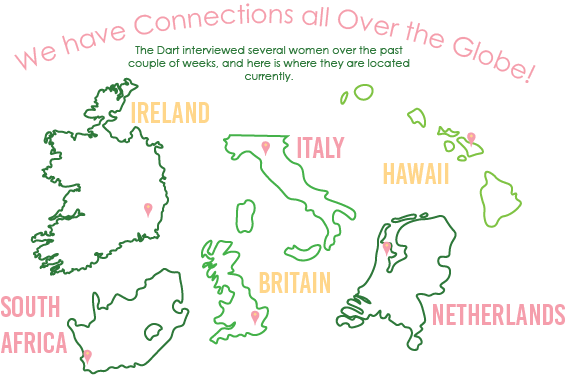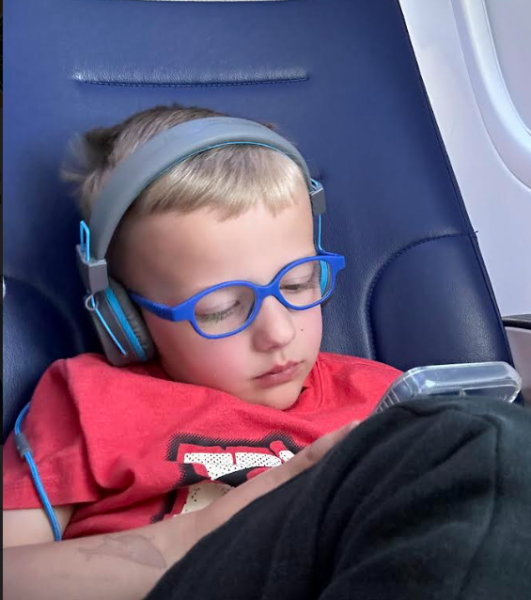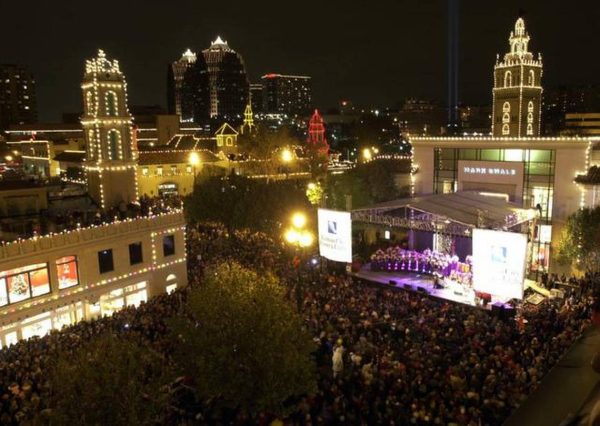Urban Outrage
October 23, 2014
by Maggie Knox, alternative coverage by Jessie Culver, photos taken and compiled by Alex Davis
As she searched around online across different websites and stores targeted towards teens, she found herself scrolling through pages of sweaters for sale.
One at Urban Outfitters caught her eye. It was a light pinkish color and looked comfortable, but it was for sale for $129. Although it was out of her price range, she clicked on the item.
She read the words emblazoned across the front of the top.
KENT STATE UNIVERSITY.
She enlarged the photo of the sweatshirt to get a better look.
What is that?
It looked to be red blood stains and splatters embellishing the area of the shirt where the heart would be.
But what she may not have known, because it was way before her time, was that there was a shooting at Kent State University in 1970.
Why would Urban Outfitters market this product to their main age demographics of teenagers and college-aged kids?
[nggallery id = 896]
Young adult clothing retailer Urban Outfitters has recently been under fire for selling what they called a “Vintage Kent State Sweatshirt.” However, the product was taken by many to be a crude reference to a shooting on the Kent State campus May 4, 1970.
The sweatshirt was put up for sale on Sept. 14 and taken down by early morning Sept. 15.
Such quick action was taken by Urban Outfitters management because almost immediately after the product was posted online, people across the world backlashed on social media platforms, primarily Twitter.
According to Urban Outfitters’ original description of the sweatshirt, it is “washed soft and perfectly broken in” and “cut in a loose, slouchy fit.” Only one Kent State sweatshirt was put up for sale, as the company noted that they “only have one, so get it or regret it!”
Twitter users were outraged, calling the sweatshirt a perfect example of “bad taste” and “garbage” alike.
By 1:15 a.m. Sept. 15, the company had removed the single sweatshirt from their website. Later that morning, Urban Outfitters released a statement via Twitter apologizing “for any offense our Vintage Kent State Sweatshirt may have caused.”
“It was never our intention to allude to the tragic events that took place at Kent State in 1970,” Urban Outfitters said. “We deeply regret that this item was perceived negatively and we have removed it immediately from our website to avoid further upset.”
Although many people perceived the red splotches and holes on the shirt to represent blood and wounds from the shooting, Urban Outfitters also denied that rumor. “There is no blood on this shirt nor has this item been altered in any way, ”Urban Outfitters stated. “The red stains are discoloration from the original shade of the shirt and the holes are from natural wear and fray.”
In response, Kent State University issued a statement regarding the product and its connection with the school shooting. According to Kent State, they “lost four students that day while nine others were wounded and countless others were changed forever.”
The university also responded to the negative connotation implied by the blood-looking stains on the shirt. “We take great offense to a company using our pain for their publicity and profit,” Kent State said. “This item is beyond poor taste and trivializes a loss of life that still hurts the Kent State community today.”
The school went even further by inviting Urban Outfitters’ leaders as well as whomever may have purchased the product “to tour our May 4 Visitors Center, which opened two years ago, to gain perspective on what happened 44 years ago and apply its meaning to the future.”
This is not the first time the popular clothing chain has been under fire for selling controversial products.
In April 2012, the retailer put a $100 yellow t-shirt up for sale. Embroidered onto the front pocket of the shirt was a six-pointed star that looked nearly identical to the star worn by Jews during the Holocaust.
Another product sold by the retailer was a grey v-neck t-shirt with the words “Eat less” emblazoned across the front. Put up for sale in June 2010, both in stores and online, the shirt had caused enough controversy that the company removed the shirt from their website. However, they had not removed it from the stores until seasonal clothes were finally cycled through. Huffington Post conducted a survey on whether the item was tasteless or tasteful; 65% or surveyors answered “tasteless.”
More recently, in January 2014, a cropped shirt covered with the word “depression” was sold but nearly immediately removed from the Urban Outfitters website.
Other products that have caused controversy:
“Ghettopoly,” a racist twist on classic Monopoly.
“Navajo” products, which were merely tribally-printed knick-knacks illegally using the Navajo tribe name to describe the products.
T-shirts promoting drinking and stereotyping Irish drinking culture.
Flasks, shot glasses and pint glasses shaped to resemble prescription drug containers.
But how have these products, mainly the Kent State University sweatshirt, affected STA students?
“I have seen the Kent State University item,” sophomore Maya Krygiel said. “It was the item Urban [Outfitters] had made that I was most angry about. I thought it was very offensive and just inappropriate.”
Krygiel also stated that she has never bought anything from Urban Outfitters and won’t in the future.
“After seeing those [products], I’m never shopping at UO,” Krygiel said. “I won’t support a place who’s selling products like those. I’m very mad, but also confused. Why would a store sell an item of clothing like [the Kent State sweatshirt]?”
STA junior Grace Girardeau also finds offense in the products, but feels she is not directly affected by them.
“I haven’t seen the sweatshirt, but to me that just seems really unnecessary,” Girardeau said. “[Urban Outfitters] could [try to] justify or explain their reasoning, but there was no need to make that sweatshirt.”
According to Girardeau, the retailer and its consumers go for shock value when it comes to product sales.
“It doesn’t exactly outrage me, but I can see why it would outrage someone else,” Girardeau said. “I just dismiss any tee with an offensive slogan or any dress with an unrealistic amount of fabric.”
Bishop Miege High School junior Olivia Gallo says she doesn’t shop at Urban Outfitters “because the clothes are pretty expensive.” According to Gallo, the public’s outrage to the Kent State sweatshirt is understandable “because some people may see it as crossing the line, because it does.”
Gallo also sees future consequences for the retailer.
“The company definitely is out of line selling some of the things they do,” Gallo said. “If they don’t shape up soon, they will lose customers and even more respect.”
According to Krygiel, the casual sale of these products is “just horrible [for] those who are struck with these problems, like racism and depression. [Now] there’s a store promoting those issues.”









